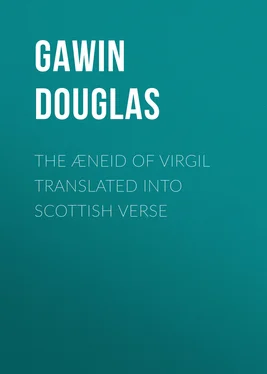Gawin Douglas - The Æneid of Virgil Translated Into Scottish Verse
Здесь есть возможность читать онлайн «Gawin Douglas - The Æneid of Virgil Translated Into Scottish Verse» — ознакомительный отрывок электронной книги совершенно бесплатно, а после прочтения отрывка купить полную версию. В некоторых случаях можно слушать аудио, скачать через торрент в формате fb2 и присутствует краткое содержание. Жанр: foreign_poetry, Поэзия, foreign_antique, foreign_prose, на английском языке. Описание произведения, (предисловие) а так же отзывы посетителей доступны на портале библиотеки ЛибКат.
- Название:The Æneid of Virgil Translated Into Scottish Verse
- Автор:
- Жанр:
- Год:неизвестен
- ISBN:нет данных
- Рейтинг книги:4 / 5. Голосов: 1
-
Избранное:Добавить в избранное
- Отзывы:
-
Ваша оценка:
- 80
- 1
- 2
- 3
- 4
- 5
The Æneid of Virgil Translated Into Scottish Verse: краткое содержание, описание и аннотация
Предлагаем к чтению аннотацию, описание, краткое содержание или предисловие (зависит от того, что написал сам автор книги «The Æneid of Virgil Translated Into Scottish Verse»). Если вы не нашли необходимую информацию о книге — напишите в комментариях, мы постараемся отыскать её.
The Æneid of Virgil Translated Into Scottish Verse — читать онлайн ознакомительный отрывок
Ниже представлен текст книги, разбитый по страницам. Система сохранения места последней прочитанной страницы, позволяет с удобством читать онлайн бесплатно книгу «The Æneid of Virgil Translated Into Scottish Verse», без необходимости каждый раз заново искать на чём Вы остановились. Поставьте закладку, и сможете в любой момент перейти на страницу, на которой закончили чтение.
Интервал:
Закладка:
CAP. XII
Heir followis of the famus queyn Dydo
The fatale dynt of deth and mortale wo.
Bot now the hasty, egyr, and wild Dydo,
Into hyr cruell purpos enragyt so,
The bludy eyn rollyng in hir hed,
Wan and ful paill for feir of the neir ded,
With chekis freklyt, and al of tythirris bysprent,
Quakyng throu dreid, ruschit furth, or scho wald stent,
Onto the innar wardis of hyr place,
As wod woman clam on the byng, allace!
And furth scho drew the Troiane swerd, fute hait,
A wapyn was neuer wrocht for syk a nate.
And sone as sche beheld Eneas clething,
And eik the bed bekend, a quhile wepyng,
Stude musyng in hir mynd; and syne, but baid,
Fel in the bed, and thir last wordis faid:
O sweit habyte, and lykand bed, quod sche,
So lang as God lyst suffir and destane,
Ressaue my blude, and this sawle that on flocht is,
And me delyvir from thir hevy thochtis.
Thus lang I levyt haue, and now is spent
The term of lyfe that forton heth me lent;
For now my gret gost vndir erth mon go.
A richt fair cite haue I beild alsso:
Myne awyn wark and wallys behald haue I:
My spows wrokyn of my brothir ennemy,
Fra hym byreft hys tressour, and quyt hym weill.
Happy, allace! our happy, and ful of seyll,
Had I beyn, only gyf that neuer nane
At our cost had arryvit schip Troiane.
And sayand this, hir mouth fast thristis sche
Doun in the bed: Onwrokyn sal we de?
De ws behufis, scho said, and quhou; behald!
And gan the scharp sword to hir breist vphald;
Ȝa, thus, thus lykis ws starve and to depart:
And, with that word, rave hir self to the hart.
Now lat ȝon cruel Troiane swelly and se
This our fyre funerale from the deip see,
And of our deth turs with hym fra Cartage
Thys takyn of myscheif in hys vayage.
Quod scho: and, tharwith, gan hir seruandis behald
Hir fallyn and stekit on the irne cald;
The blude outbullyrand on the nakyt swerd;
Hir handis furthsprent. The clamour than and rerd
Went to the toppys of the large hallys;
The noys ran wild out our the cite wallis,
Smate all the town with lamentabill murnyng.
Of greting, gowlyng, and wyfly womentyng,
The ruffis dyd resound, bray, and rayr,
Quhil huge bewalyng al fordynnyt the air:
Nane other wys than thocht takyn and doun bet
War al Cartage, and with ennemys ourset,
Or than thar natyve cite, the town of Tyre;
And furyus flambe, kendillit and byrnand schyre,
Spredyng fra thak to thak, baith but and ben,
Als weil our templis as howsis of othir men.
Hir systir An, spreitles almaist for dreid,
Heirand sa feirful confluens thyddir speid,
With nalys ryvand reuthfully hir face,
And smytand with hir nevis hir breist, allace!
Fast ruschis throu the myddis of the rowt,
And on the throwand, with mony sprauch and schout,
Callys by name: Systir germane, quod scho,
Och! was this it thou fenȝeit the to do?
Hes thou attempyt me with syk dissait?
This byng of treys, thir altaris, and fyris hait,
Is this the thyng thai haue onto me dycht?
Quhat sall I first compleyn, now dissolate wight?
O deir systir, quhen thou was reddy to de,
Ha! quhy hes thou sa far dyspysyt me
As to reffus thi systir with the to wend?
Thou suld haue callyt me to the sammyn end;
That the ilk sorow, the sammyn swerd, both tway,
And the self hour, mycht haue tane hyne away.
Thys funeral fyre with thir handis biggyt I,
And with my voce dyd on our goddis heir cry,
To that effect as, cruel, tobe absent,
Thou beand thus sa duylfully heir schent!
Sistir, allace! with my counsell haue I
The, and my self, and pepill of Sydony,
The heris all, and eik thi fayr cite,
Distroyt and ondoyn for ay, quod sche.
Fech hiddir sone the well watir lew warm,
To wesch hir woundis, and hald hir in myne arm;
Syne with my mowth at I may sowk, and se
Gyf spreit of lyve left in hir body be.
This sayand, the hie byng ascendis onane,
And gan enbrays half ded hir systir germane,
Culȝeand in hir bosum, and murnand ay,
And with hir wympil wipyt the blude away.
And scho agane, Dydo, the dedly queyn,
Pressyt fortil vplift hir hevy eyn,
Bot tharof falys; for the grysly wound
Deip in hir breist gapis wyde and onsound.
Thrys scho hir self raxit vp to rys;
Thrys on hir elbok lenys; and als feill sys
Scho fallys bakwart in the bed agane:
With eyn rollyng, and twynkland vp ful fane,
Assays scho to spy the hevynys lyght;
Syne murmouris, quhen scho tharof gat a sycht.
Almychty Juno havand reuth, by this,
Of hir lang sorow and tarysum ded, I wys,
Hir mayd Irys from the hevyn hes send,
The throwand sawle to lowys, and mak ane end
Of al the juncturis and lethis of hir cors:
Becaus that, nothir of fatis throu the fors,
Nor ȝit by natural ded, peryschit sche,
Bot fey, in hasty furour emflambyt hie,
Befor hir day had hir self spilt;
Or that Proserpyne the ȝallow haris gilt
From hir fortop byreft, or dubbyt hir hed
Onto the Steygian hellis flude of ded.
Tharfor dewy Iris throu the hevyn
With hir safron weyngis flaw ful evin,
Drawand, quhar scho went, forgane the son cleir,
A thousand cullouris of diuers hewys seir;
And abufe Dydoys hed arest kan:
I am commandyt, said scho, and I man
Omdo this hayr, to Pluto consecrate,
And lowis thi sawle out of this mortale stait.
Thys sayand, with rycht hand hes scho hynt
The hair, and cuttis in twa, or that scho stynt;
And thar withall the naturale heyt outquent,
And, with a puft of aynd, the lyfe furthwent.
THE PROLOUG OF THE FYFT BUKE
Gladys the grond the tendir florist greyn,
Byrdys the bewys and thir schawys scheyn,
The wery huntar to fynd hys happy pray,
The falconeyr rych ryver onto fleyn;
The clerk reiosys hys bukis our to seyn,
The luffar to behald hys lady gay;
Ȝong folk thame schurtis with gam, solace, and play:
Quhat maist delytyth or lykis euery wight,
Tharto steris thar curage day and nycht.
Knychtis delytis to assay sterand stedys,
Wantoun gallandis to trayl in sumptuus wedis;
Ladeys desyris to behald and be seyn;
Quha wald be thrifty courtyouris says few credis:
Sum plesance takis in romans that he redis,
And sum hes lust to that wes nevir seyn:
Quhou mony hedis als feil consatis beyn;
Twa appetitis oneth accordis with othir;
This lykis the, perchance, and not thi brothir.
Plesance and joy richt hailsum and perfyte is;
So that the wys tharof in proverb wrytis,
A blith spreit makis greyn and floryst age.
Myne author eyk in Bucolykis endytis,
The ȝong enfant fyrst with lauchtir delytis
To knaw hys moder, quhen he is litil page:
Quha lauchis not, quod he, in thar barnage,
Genyus, the God, delytyth not thar tabill,
Nor Juno thame to kepe in bed is habill.
The hie wysdome and maist profound engyne
Of myne author Virgile, poete dyvyne,
To comprehend, makis me almaist forvay,
So crafty wrocht hys wark is, lyne by lyne.
Tharon aucht na man irk, compleyn, nor quhryne:
For quhy? he altyrris hys style sa mony way;
Now dreid, now stryfe, now lufe, now wo, now play,
Langeir in murnyng, now in melody,
To satyfy ilk wightis fantasy;
Lyke as he had of euery thyng a feill,
And the willys of euery wight dyd feill;
And tharto eyk so wysly writis he
Twiching the proffyte of the common weill,
Hys sawys beyn full of sentencis, euery deill,
Or morale doctryne, that men suld vycis fle:
Bot gyf he be nocht joyus now lat se;
For quha so lyst seyr glaidsum gemmys leyr,
Ful mony myrry abaytmentis followis heir.
Интервал:
Закладка:
Похожие книги на «The Æneid of Virgil Translated Into Scottish Verse»
Представляем Вашему вниманию похожие книги на «The Æneid of Virgil Translated Into Scottish Verse» списком для выбора. Мы отобрали схожую по названию и смыслу литературу в надежде предоставить читателям больше вариантов отыскать новые, интересные, ещё непрочитанные произведения.
Обсуждение, отзывы о книге «The Æneid of Virgil Translated Into Scottish Verse» и просто собственные мнения читателей. Оставьте ваши комментарии, напишите, что Вы думаете о произведении, его смысле или главных героях. Укажите что конкретно понравилось, а что нет, и почему Вы так считаете.












